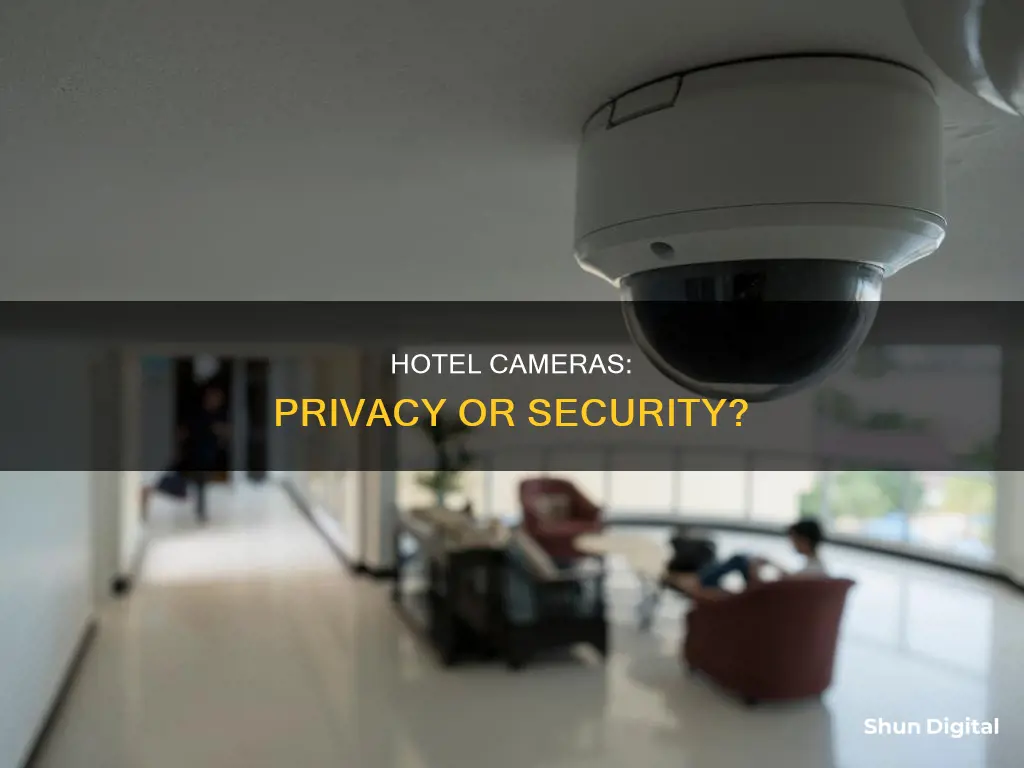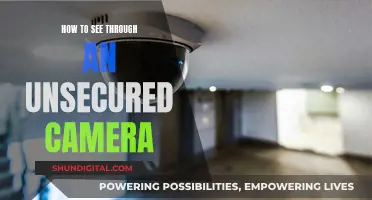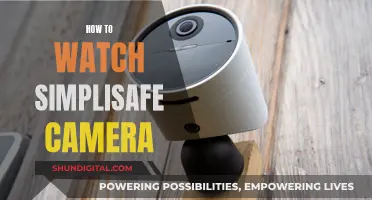
Hotels generally have security cameras installed in common areas such as the lobby, hallways, elevators, and pool areas. These cameras are placed in strategic locations to deter crime and enhance customer service. While hotels typically do not have cameras in guest rooms, it is not uncommon for hidden cameras to be present, installed by rogue hotel employees or previous guests. To address privacy concerns, several states in the U.S. have made it illegal to install or use cameras in private places without authorisation.
| Characteristics | Values |
|---|---|
| Legality of cameras in hotel rooms | In the U.S., it is not legal to record hotel guests in their private spaces without their consent. However, there is no federal law pertaining to hidden camera usage. |
| Hotel policies on cameras in rooms | The American Hotel and Lodging Association, which represents 80% of all franchise hotels, does not consider it standard practice to have cameras in guest rooms. |
| Hotel staff involvement | Rogue hotel employees could easily hide small cameras inside devices like clocks and lamps. |
| Camera usage in other areas of the hotel | Cameras are usually found in common and shared areas like lobbies, hallways, elevators, pool areas, dining, parking and swimming areas. |
| Purpose of cameras | Cameras are used to deter crime and help keep guests safe. They can also be used to monitor guest activity to enhance customer service. |
| Hotel crime rates | Hotel crime rates are increasing. |
What You'll Learn
- Hotels do have security cameras in common areas
- Cameras are placed in strategic locations to deter crime and keep guests safe
- Security experts say the chances of hidden cameras in hotel rooms are slim
- Hotel staff conduct room sweeps and regular background checks to ensure guest safety
- If you suspect hidden cameras, shine a bright light on objects to detect a camera lens

Hotels do have security cameras in common areas
The presence of security cameras in hotels offers several benefits, such as improved guest safety and better customer service. The footage from these cameras can be used as evidence to help solve crimes and protect the hotel from false claims and liability. Additionally, monitoring guest activity, such as when they come and go from their rooms, can help ensure that guests don't have to wait long for an elevator or that their room is clean and ready when they arrive.
However, there are also some disadvantages to consider. Some guests may feel that their privacy is being invaded by the presence of security cameras. The installation and maintenance of security cameras can also be costly for hotels. In some cases, the presence of security cameras may give guests a false sense of security.
It's worth noting that the placement of security cameras in hotels can vary, and not all hotels have the same level of security. Some hotels may have cameras in all the common areas, while others may have them only in certain locations. Additionally, some hotels may not have dedicated security departments due to financial constraints.
To ensure your privacy, it is recommended to research the hotel's security measures before booking, especially if you have specific security concerns. While hotels generally do not have cameras in guest rooms due to privacy laws, it is always a good idea to be vigilant and inspect your room for any hidden cameras or recording devices.
Frankfurt Brothels: Are They Under Surveillance?
You may want to see also

Cameras are placed in strategic locations to deter crime and keep guests safe
Hotels typically place cameras in common areas such as the lobby, hallways, elevators, pool areas, entrances, and parking lots. These cameras are strategically positioned to deter crime and enhance guest safety. They help monitor activity within and around the hotel, aiding in the identification of potential security risks and preventing incidents like theft, assault, and vandalism.
The presence of security cameras in hotels offers several benefits. Firstly, they improve guest safety by deterring criminal activity and aiding in the identification and apprehension of criminals. Secondly, they enable hotels to provide better customer service by monitoring guest movement, such as when they enter and exit their rooms, to ensure efficient services like timely room cleaning and reduced elevator wait times.
Additionally, in the event of a crime or accident, security camera footage can be used to determine what occurred and assign responsibility, protecting the hotel from false claims and liability.
While some guests may view security cameras as an invasion of privacy, most accept them as a crucial safety measure. Hotels take guest privacy seriously, and the use of hidden cameras in guest rooms is generally prohibited by law in many places. However, it is important to be vigilant and conduct your own inspections for hidden cameras, as rogue employees or previous guests may have installed them without the hotel's knowledge.
PennDOT Cameras: Live Access and Availability for Viewers
You may want to see also

Security experts say the chances of hidden cameras in hotel rooms are slim
It's understandable to be concerned about hidden cameras when staying in a hotel room. However, according to security experts, the likelihood of finding hidden cameras in trusted hotel chains, particularly in the United States, is slim. Here are some reasons why:
Legal and Reputation Concerns
Hotels are subject to various laws and regulations that prohibit hidden cameras in guest rooms. In the United States, it is illegal in every state to audio record individuals without their knowledge. Additionally, about 13 states have made it illegal to install or use cameras in private spaces without authorization. Hotels would risk significant legal consequences and damage to their reputation if they were found to be secretly recording their guests. As a result, hotels have strict security protocols and routinely inspect rooms to ensure the safety and privacy of their guests.
Low Incentive for Spying
Surveillance experts suggest that ordinary travellers are unlikely targets of hidden cameras in hotel rooms. There is little to no value in spying on non-high-profile individuals, and hotels are aware that violating their guests' privacy could lead to massive liabilities and reputational damage.
Visibility of Cameras in Common Areas
Hotels typically have security cameras installed in common and shared areas such as lobbies, hallways, and pool areas. These cameras are visible and serve the purpose of maintaining security and safety for guests and staff. Hotels have no incentive to hide cameras in guest rooms when they can already monitor public areas.
Steps to Ensure Privacy
Hotels take proactive steps to ensure guest privacy. They perform regular background checks on staff, inspect rooms for suspicious items or tampering with fixtures, and some even conduct sweeps for hidden devices. Additionally, guests can also take their own precautions, such as requesting a room change or using apps and devices to detect hidden cameras.
While the possibility of hidden cameras in hotel rooms cannot be entirely ruled out, it is important to remember that such incidents are rare, and hotels have strong incentives to protect their guests' privacy and adhere to legal requirements.
Paranormal Caught on Camera: Best Viewing Platforms
You may want to see also

Hotel staff conduct room sweeps and regular background checks to ensure guest safety
Hotel staff have a duty of care to their guests, and this includes ensuring their safety and security. While hotels are not generally in the business of spying on their guests, there are measures in place to ensure guest safety, including room sweeps and regular background checks.
Room Sweeps
Hotel cleaning staff, or housekeeping, are responsible for maintaining the cleanliness and hygiene of the hotel. This includes guest rooms, public areas, and other facilities. Their role is vital in ensuring a pleasant and comfortable environment for guests. Housekeeping staff are trained to report any suspicious activity and to be vigilant for any signs of tampering with the room, such as the peephole or smoke detectors. They also play a key role in ensuring guest privacy, and this includes being aware of any hidden cameras that may have been installed by previous guests or staff.
Regular Background Checks
Hotels conduct regular background checks on their staff to ensure the safety of their guests. This is particularly important for staff who have access to guest rooms, such as housekeeping and maintenance staff. By performing these checks, hotels can help to prevent incidents of theft, assault, or invasion of privacy.
Security Protocols
Hotels typically have security protocols in place, which include the use of security cameras in public areas such as lobbies, hallways, and pool areas. These cameras act as a deterrent to criminal activity and help to ensure the safety of guests and staff. Security staff monitor these cameras and patrol the property to respond to any security incidents.
Guest Privacy
Hotels are also mindful of guest privacy, and this is reflected in the limited use of cameras in guest rooms. While it is not standard practice to have cameras in guest rooms, some hotels may have cameras in certain areas for security purposes, such as at the entrance to a room or in the hallway.
Additional Safety Measures
In addition to room sweeps and background checks, hotels employ other measures to ensure guest safety. This includes providing information on emergency procedures, maintaining proper lighting in public areas, and implementing access control measures. Hotels also encourage guests to report any suspicious activity and to be vigilant about their own safety.
In summary, hotel staff conduct room sweeps, regular background checks, and follow security protocols to ensure the safety and security of their guests. These measures are designed to protect guests from potential harm and to provide a comfortable and enjoyable stay.
Android Smartwatches: Camera-Equipped or Not?
You may want to see also

If you suspect hidden cameras, shine a bright light on objects to detect a camera lens
While hotels generally do have security cameras in common areas like the lobby, hallways, elevators, and pool areas, it is rare for them to have cameras in guest rooms. This is because, in the U.S., it is illegal to record guests in private spaces without their consent. However, there have been instances where hidden cameras have been found in hotel rooms, and if you suspect that you are being watched, there are ways to detect a camera lens.
If you suspect that there may be a hidden camera in your hotel room, one way to detect it is by shining a bright light on objects that could potentially house a camera. Camera lenses are often coated with materials that help them avoid reflection and capture clearer images. However, when a bright light is shone on them, they will usually shine with a blue or purple tint. You can use your phone's flashlight to scan objects such as alarm clocks, lamps, smoke detectors, decorative items, and electrical outlets, which are common places for hidden cameras.
In addition to using a bright light, there are other methods you can use to detect hidden cameras. One way is to use smartphone apps that can detect infrared light emitted by hidden cameras. These apps allow you to scan the room and identify any unusual sources of light that could indicate the presence of a camera. Another method is to use a radio frequency (RF) detector, which can locate wireless signals that cameras emit. RF detectors can identify the frequencies used by surveillance devices, helping you determine if there are any hidden cameras in the room.
If you have serious concerns about hidden cameras, you can also consult with hotel security or hire professional security experts to conduct a thorough sweep of the room. While the chances of finding a hidden camera in a hotel room are slim, especially in reputable hotels, it is always better to be cautious and ensure your privacy.
Finding the Best Spots to Mount 15 Cameras
You may want to see also
Frequently asked questions
Hotels do monitor their security cameras, which are typically located in common areas such as the lobby, hallways, elevators, and pool areas. These cameras are used to deter crime, identify potential security risks, and enhance customer service. However, it is important to note that the presence of security cameras in hotels can be a privacy concern for some guests.
Hotel rooms are generally not monitored by cameras as it would violate laws in many states and countries. However, there may be exceptions for security purposes, and hidden cameras may be installed without the guests' knowledge, which is illegal in most places.
To detect hidden cameras, you can use your phone's flashlight to shine a bright light on objects like alarm clocks, lamps, and other common items where cameras may be hidden. Camera lenses will usually reflect a blue or purple tint. You can also use apps that detect electromagnetic fields or infrared lights, or scan the hotel's Wi-Fi network for connected devices.
If you discover a hidden camera, do not touch or remove it. Cover the camera with a towel or blanket, and immediately notify hotel management and the police. Request a different room or a refund, and contact your travel booking service to report the incident.







